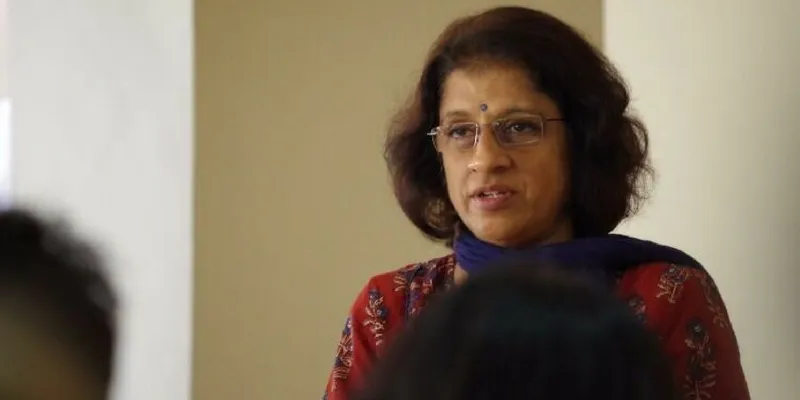Vanita Viswanath talks about women empowerment through employment
Social entrepreneur, organisational mentor, and scholar are few words to describe Vanita Viswanath. To describe leadership, she says one must be open to new influences as change is happening faster than ever before. "The tension between depth and scale in inclusion work is real, and we always have to navigate between the two," she says.
Bengaluru-based social entrepreneur and researcher on inclusive entrepreneurship Vanita Viswanath wears many hats with aplomb. She leads Udyogini, a Delhi-based non-governmental organisation and is a board member, and strategic and operational advisor and mentor for Jagriti Yatra, the popular two-week entrepreneurial train journey.

She is also an advisor for Sattva Consulting and is the founding trustee and chairperson of Aajeevika Bureau, which provides services, advocacy and research for migration of the poor.
In conversation with YourStory, Vanita spoke about her experience in social entrepreneurship, strategic planning, policy making and advocacy.
Childhood and career
Vanita says she counts her maternal grandmother as her inspiration.
"She defied tradition after her early widowhood (with three children to raise by herself) in the conservative 1930s by going to college and becoming the first graduate of Carnatic music from Madras University. She defied tradition again, by 'crossing the seas' to work in England."
Vanita was educated in Delhi, the UK and the US, and chose to study politics for her doctorate. However, she soon shifted towards social development. "It involved intense field-work in South India which I enjoyed so much that I decided then that development studies would be my career domain," she said.
International participation and recognitions
Before venturing into the social sector, Vanita worked with the World Bank in Washington, holding various positions, including co-director of a four-year Women's Enterprise Management Training programme operational in three Asian countries.
She also authored the first policy document on Asian Development Bank’s collaboration with NGOs. She was recognised as a finalist of the Schwab Foundation India - Social Entrepreneur of the Year Award 2012, and is the recipient of The International Alliance of Women, Washington DC - World of Difference Award 2013.
Vanita says,
"It was while working at the World Bank that I first learnt about policy where I had to work with national governments in the Asia region. Later, while leading Udyogini, I had to work with state and centre governments where we had our programmes, and I understood not just about policy, but about the serious gaps between policy and implementation."
Her role at the World Bank involved conceptualising, monitoring and providing technical assistance to the Women's Enterprise Management Training and Outreach Program (Wemtop) which was implemented in India, Bangladesh and the Philippines.
She facilitated the training of several hundred NGOs, and the women they were assisting across India. The curriculum from her programme was adapted for World Bank’s initiatives for women's enterprises in Eastern Europe, Latin America and Africa.
Her Yatra with Jagriti Sewa
The Jagriti Sewa Sansthan is a network of enterprise leaders who seek to 'build India through enterprise'. To boost entrepreneurship, especially in Tier II and Tier III cities, the Jagriti Sewa Sansthan launched Jagriti Yatra in 2008 and aims to nurture one lakh leaders over the next 15 years. It is focused on building enterprise-led development among the Indian youth and shift the mindset of young India from job seekers to job creators.
Vanita calls her work at Jagriti Sewa Sansthan exciting. She first catered to the digital literacy for women's programme that trained nearly 2,000 ‘Internet Saathis’ to Udyam Sakhis, or women entrepreneurs who will use their digital literacy skills for enterprises.
"Along with a woman Yatripreneur who started her own social consulting firm post the Yatra, I have just completed the assessment of 10 years of the Jagriti Yatra. I am now initiating the documentation of the goal clarity and transformation of women Yatris during the Yatra."
Workplace inclusion for women and empowerment
Vanita says women are still not part of most leadership teams, though they are employed in various other positions in organisations. "It's not enough to increase women's employment, which companies might comply with as part of showing diversity, but to build women leaders," she says.
She says her biggest failure is she could not attract enough female staff for Udyogini. Though was supposed to be an organisation for and by women, she was the only woman who stayed long and until the time she left in 2014.
"Even though we tried special benefits to be given to women (supported strongly by the men in the organisation), clearly they were not enough. I think the reasons are the remote field locations in north and central India and compensation perhaps were not attractive enough. The overall learning is that packages in the development sector have to become attractive but we need to recruit from the region where the job is and build capacity on a continuous basis so that women see a growth path in the organisation."
Thanks to her work on entrepreneurship among women, Vanita says the route to sustainable enterprises for women is to build specific business models. "Like, having child care costs as part of the business plan rather than an optional add-on to be supported separately. Investors need to think this way and make work-life balance conversations become a thing of the past," she concludes.







